#modern culture of narcissism
Text
This know also that in the last days perilous times shall come. For men shall be lovers of their own selves, covetous, boasters, proud, blasphemers, disobedient to parents, unthankful, trucebreakers, false accusers, incontinent, fierce, despisers of those that are good. Traitors, heady, highminded lovers of pleasures more than lovers of God;
Having a form of godliness, but denying the power thereof: from such, turn away
2 Timothy 3 KJV Bible
0 notes
Text
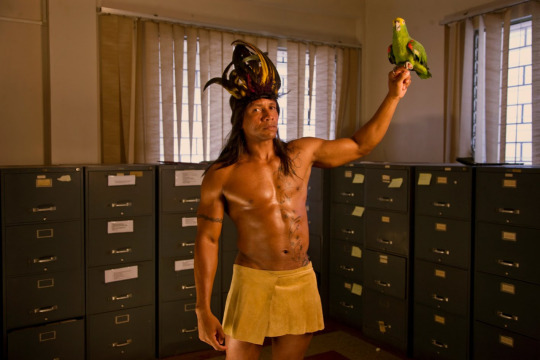
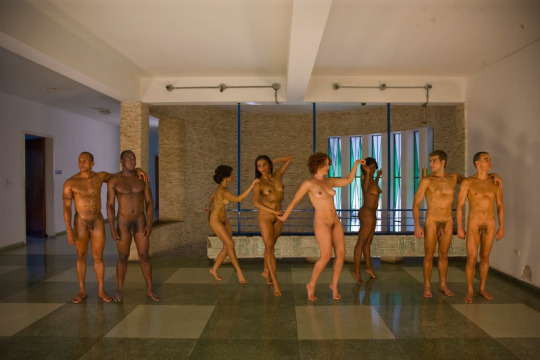

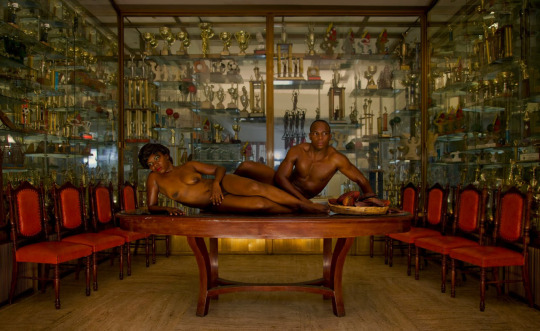

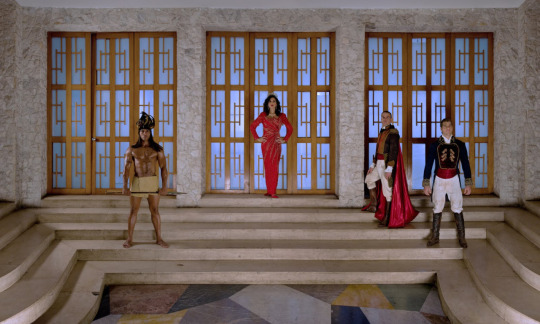

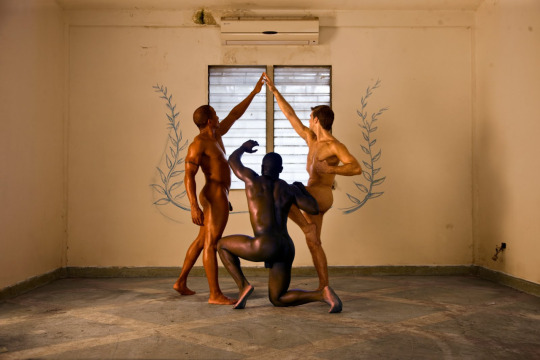
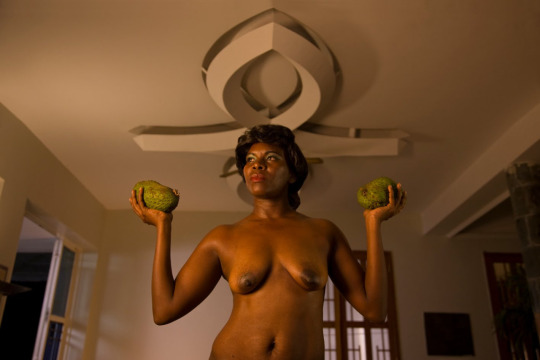
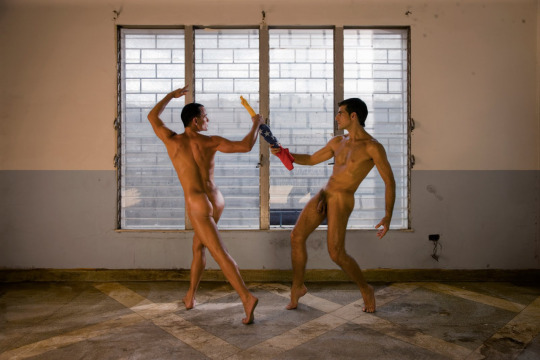
Ensayando la Postura Nacional by Alexander Apóstol
Based on the paintings of Pedro Centeno Vallenilla
Caracas experienced a strong urban construction growth after the death of the dictator Juan Vicente Gómez in 1936 until the 70´s. Important political changes: European and Latin-American migrations, and especially petroleum costs variations made Venezuelan mentality change at a speeding race to new perspectives that were demonstrated in different areas, architecture being the main element of change towards a modern city. Besides the big social differences, from then on, the Venezuelans have conceived to an extreme this modern period of time as the dream of a better future.
In that time, important plastic artist irrupted during the 40´s, 50´s and 60´s; Escuela de caracas (landscaping), Los Disidentes (abstraction), and the Techo de La Ballena (informalism) were some of the most important avant-garde movements. Curiously enough, the Venezuelan artist Pedro Centeno Vallenilla, formed under the fascist Italian regime and exhibitor of a peculiar nationalist theme with a characterized mannerist and exaggerated aesthetic, worked independently from the avant-garde movements, he was even considered as a minor artist by them. Due to Vallenilla´s profound political views at the time, he was able to establish himself as the official painter during the dictatorship of Marcos Pérez Jiménez in the 50´s, where buildings like the National Capitol, the National Military or collections and private homes were decorated with his Works. Nowadays his works are still hung in these official buildings, where the nation’s history and the autochthonous elements together with the exaggerated and idealized aesthetic of the body and race, are the main characters in his work.
What interests me is how his fertile visual language feeds the creation myths of the birth of the nation and establishes it like a part of the Venezuelan culture, in the political, social, military and even economic grounds of the country; where his work exemplifies, maybe fortunately, the prejudice, contradictions and acceptations on how Venezuelans want to see ourselves and how we wanted to be seen (and still want to be), contrasting with the exacerbated and vulnerable narcissism that fundaments itself on the starting resentments that we drag on form the colonial times.
Finally I would like to focus Centeno Vallenilla´s work, independently from his pictorial quality, like the heir of a confused Venezuelan modernity in conception and ideology, confronted in the same way with the confused and complex political and social times that we are now living. Where the frontier between liberal ideologies and economic pragmatism associated with the conservatives, are faded together with the political ways of the country.
In the film and photos, works of Centeno Vallenilla dedicated to the nation’s history, race and traditions, are converted into a tableaux vivant by people that come from the marginated areas of Caracas, but that are situated in the natural context of this artist, these spaces are modern but at the same time unused buildings, like a mansion turned into an office building; Nevertheless, these models try again and again, without achieving the goal, of recreating work by work The forced postures of the personalities represented in Vallenilla´s Works, demonstrating that there is a possibility that the idiosyncrasy of Venezuela comes from the eternal intent, with form but without meaning, of imagining improvised utopias that result in mere rehearsals of the country.
#art#paintings#photography#venezuela#pedro centeno vallenilla#venezuelan#alexander apóstol#venezuelan art
75 notes
·
View notes
Text
RE Villains and my psychological opinion (+mini history lesson hehe.)
I really like the way CAPCOM writes their villains. Everyone talks about the main protagonist(s) such as Chris, Leon, Jill, Claire, etc. I think we should definitely give some credit to the evil guys of the franchise. I have my own two favorite villains, Lord Saddler (RE4/RE4R), and Svetlana (Damnation). I wish I could write about ALL the characters but that would almost be a book's length.
(I am no expert in psychology, i barely survived my spring semester lol. I am not licensed and i most certainly am not a doctor. The history part is true, but the psychology is just me being hyper fixated on the minor details. Once again, take this lightly. Also, i have my psych final soon and I'm so ready to kick ass.)
There's just something so alluring to me about the obsession with one being known as a God or God's messenger. Lord Saddler really got me thinking about how easy it is for a narcissist to make a cult about, essentially, themselves. Everyone knows the story about Narcissus, the mythological Greek God, and how he fell in love with his own reflection and basically starved himself to death. Hence why the term narcissism derived from the myth of Narcissus. Narcissism goes deeper than just one being self-centered. A narcissist is much more evil- they lack empathy and exploit others for their own goals/achievements. I would like to believe that Lord Saddler definitely has a narcissistic disorder because he took it upon himself to become, and as I like to call it, The God of Plaga. I mean, the dude literally created his own "bible" and his own insignia. He, like James in RE0, believe that they can conquer the world using the parasite. But the psychology behind it, or least in my humble knowledge, is really just a narcissist playing God. Saddler's psychological disorder is being projected onto religion, maybe in a response to a traumatic event. Freudian theory states that projection is a psychological defense mechanism where an individual projects unwanted thoughts, feelings, and motives on another person/group. I'd like to think that Saddler is a narcissist that projects his own motives as defense mechanism using religious methods.
I'm no expert on modern religion but I do like to think myself as someone well versed in BCE and CE religion. As i played through the game, I couldn't help but notice some similarities between Saddler and his cult and some ancient religious beliefs. Ancient civilizations often believed that their God's power was absolute, thus making religion an important part of their culture. The village in which the game takes place obviously contains a small church and then a castle- followed by the peasant village in the beginning of the game. We know that this is a remote location in Spain and since Spain was known as Hispania during the Roman Empire, it would be safe to say that maybe MAYBE CAPCOM was inspired by the history of the country that had followed all the way to CE. I'd like to believe that Saddler was probably inspired by the ruling of the Roman Empire after Emperor Theodosius (who declared Christianity as the state religion of the empire.) Saddler, much like Theodosius, created his own religion but it was considered a minority. Once Saddler had recruited more people, his "empire" expanded, much like Christianity all across Europe in CE. His plan was obviously to expand his domain and control the world with Las Plagas. Of course, this is just my own theories and observations.
I really loved Svetlana's character as a villain. She's cunning, diplomatic, and very goal oriented. It fascinated me the way she handled situations, as if she already knew everything from the start (except the temporary unification of Russia and the US). We know she used to be a combat instructor, or still is maybe. To me, she's the definition of a wolf in a sheep's disguise. Which again brings to my point on my analysis on Saddler- a narcissistic will do anything to make sure they accomplish their goals, regardless of whose lives are at risk. Svetlana, unlike Saddler, has international support and can manipulate ambassadors to be in her favor. She already has control over her republic as president, she only needs a little more help from her international supporters. This is not only a trait from a businessperson but also someone who is very smart and probably knows how to use people at their expense. But that's every politician, in my opinion. Greed and money are basically what sugar is to kids for politicians and government officials. The way she smirked and basically declared her victory when she was talking to Buddy through the barrier was literally so evil of her part, but it made sense. At the end of the day, I'd like to think that she really just had this urge of not messing up the country since she probably faced a lot of pressure from being the first female president of the country.
Svetlana is very smart. She resigned of her position right after the civil war ended because she knew the consequences of basically breeding Nemesis’s cousins (LOL) A narcissist is never dumb and if they are then they aren’t narcissists. Narcissists are extremely smart and extremely manipulative with no sense of guilt.
I would like to talk more about James and then deeper in Resident Evil Village bc that game is literally so well written I’m like 😍🫶🏼
#resident evil 4#resident evil damnation#resident evil#re4og#re4 remake#re4make#lord saddler#Svetlana belikova
23 notes
·
View notes
Text
A Brief Introduction
A Handbook of Traditional Living
II. First Steps
Julius Evola – Men Among the Ruins
Rene Guenon – The Reign of Quantity and The Sign of the Times
Hans Herman Hoppe – Democracy: The God That Failed
Erik von Kuehnelt-Leddihn – The Menace of the Herd
Anthony Ludovici – A Defence of Aristocracy
Plinio Correa de Oliveira – Revolution and Counter-Revolution
Thomas Carlyle – Heroes and Hero Worship
III. Beyond the Pale
Oswald Spengler – The Decline of the West
Francis Parker Yockey – Imperium: The Philosophy of History and Politics
Julius Evola – Revolt Against the Modern World
Rene Guenon – The Crisis of the Modern World
Carl Schmitt – Political Theology
Ricardo Duchesne – The Uniqueness of Western Civilization
Eric Voegelin – From Enlightenment to Revolution
Eric Voegelin – Modernity Without Restraint
José Ortega y Gasset – The Revolt of the Masses
IV. Further Explorations
Julius Evola – Ride the Tiger
Erik von Kuehnelt-Leddihn – Liberty or Equality
Satoshi Kanazawa – The Intelligence Paradox
H.L. Mencken – Notes on Democracy
Arthur Moeller van den Bruck – Germany’s Third Empire
David Stove – On Enlightenment
Christopher Lasch – The Culture of Narcissism
Paul Johnson – Intellectuals
Theodore Dalrymple – Our Culture, What’s Left of It
Theodore Dalrymple – Life at the Bottom
Thomas Sowell – Affirmative Action Around the World
Wyndham Lewis – Time and Western Man
Kevin Macdonald – The Culture of Critique
V. High Culture
Roger Scruton – Beauty
Roger Scruton – The Aesthetics of Architecture
Roger Scruton – Understanding Music
Matthew Arnold – Culture and Anarchy
Harold Bloom – The Western Canon
9 notes
·
View notes
Note
Reading leaks for another massively popular media/cultural institution and it a) threw me back to TROS-era leaks and b) made me wonder how it is that such major productions have the entire story spoilt. Why is this a thing? Spoiler culture really is kind of evil honestly, like stories are just the sum of absolute narrative events in poorly summarised bullet-point.
On the other hand... in a really sad, weird way, it sort of prepares one for disaster. But then you have to wonder if such disasters are a consequence of trying to outsmart the audience/leakers (that literally sound so bad they can't be true).
Sloppy, disorganised productions, especially where people involved in the production are irritated, disgruntled, or don't give a shit because the work environment is awful. Like where things keep changing or lots of reshoots are needed due to poor planning or fickle morons being in charge. JJ's productions are leaky for this reason. He's a goofy hack who runs a loose ship and makes soulless corporate slop.
And this is pretty much a new thing. It's not even that it used to be easier to keep secrets, it's that there didn't used to be this attitude that plot beats were the be-all end-all of what made a story. Traditionally, plays were usually based on stories people already knew, and even if you didn't, they might spoil the entire plot in the first few lines. 'Knowing what happens' was not the point. The point was empathy, catharsis, thematic resonance, and communicating with the audience.
But yeah, it's definitely become so egregious partly because of pop writers increasingly thinking of the audience as the enemy and of 'outsmarting' them as being 'winning'. It all feels dripping in juvenile narcissism. But it's also HUGELY because so many of these modern stories are 'content' which was commissioned based on brand recognition from people working for hire who do not know or care what the source material was about and who have nothing to say except 'look how smart I am'.
A story is always saying something, communication is the whole point of storytelling, but Hollywood has cultivated a media culture where themes are for eighth grade book reports, stories are disposable, and no one expects anything to make sense or mean anything as long as it's flashy and has Brand Name on it.
16 notes
·
View notes
Text
“There is something obsessional in the preoccupation of many women with their bodies, although the magnitude of the obsession will vary somewhat with the presence or absence in a woman's life of other sources of self-esteem and with her capacity to gain a living independent of her looks. Surrounded on all sides by images of perfect female beauty—for, in modern advertising, the needs of capitalism and the traditional values of patriarchy are happily married—of course we fall short. The narcissism encouraged by our identification with the body is shattered by these images. Whose nose is not the wrong shape, whose hips are not too wide or too narrow? Anyone who believes that such concerns are too trivial to weigh very heavily with most women has failed to grasp the realities of the feminine condition.
The idea that women ought always to make themselves as pleasing to the eye as possible is very widespread indeed. It was dismaying to come across this passage in a paper written by an eminent Marxist humanist in defense of the contemporary women's movement:
There is no reason why a woman's liberation activist should not try to look pretty and attractive. One of the universal human aspirations of all times was to raise reality to the level of art, to make the world more beautiful, to be more beautiful within given limits. Beauty is a value in itself; it will always be respected and will attract—to be sure various forms of beauty but not to the exclusion of physical beauty. A woman does not become a sex object in herself, or only because of her pretty appearance. She becomes a sexual object in relationship, when she allows a man to treat her in a certain depersonalizing, degrading way; and vice versa, a woman does not become a sexual subject by neglecting her appearance.
It is not for the sake of mere men that we women—not just we women, but we women's liberation activists—ought to look ‘pretty and attractive,’ but for the sake of something much more exalted: for the sake of beauty. This preoccupation with the way we look and the fear that women might stop trying to make themselves pretty and attractive (so as to ‘raise reality to the level of art’) would be a species of objectification anywhere; but it is absurdly out of place in a paper on women's emancipation. It is as if an essay on the black liberation movement were to end by admonishing blacks not to forget their natural rhythm, or as if Marx had warned the workers of the world not to neglect their appearance while throwing off their chains.
Markovic's concern with women's appearance merely reflects a larger cultural preoccupation. It is a fact that women in our society are regarded as having a virtual duty ‘to make the most of what we have.’ But the imperative not to neglect our appearance suggests that we can neglect it, that it is within our power to make ourselves look better—not just neater and cleaner, but prettier, and more attractive. What is presupposed by this is that we don't look good enough already, that attention to the ordinary standards of hygiene would be insufficient, that there is something wrong with us as we are. Here, the ‘intimations of inferiority’ are clear: Not only must we continue to produce ourselves as beautiful bodies, but the bodies we have to work with are deficient to begin with. Even within an already inferiorized identity (i.e., the identity of one who is principally and most importantly a body), I turn out once more to be inferior, for the body I am to be, never sufficient unto itself, stands forever in need of plucking or painting, of slimming down or fattening up, of firming or flattening.”
-Sandra Lee Bartky, Femininity and Domination: Studies in the Phenomenology of Oppression
26 notes
·
View notes
Text
I’m always sensitive to the ways internet culture pressures people to adopt certain performances of how to be a person. And it feels like the most aggressive of these pressures are about how to be a modern woman.
For example, there’s a well-meaning but casually destructive trend that’s prevalent on Instagram. These memes idealize a state of impossible self-regard in women, an unachievable narcissism that’s justified through a garbled kind of feminist empowerment. You are not merely to be a healthy and functional adult who rises above the depredations of everyday sexism. You have to be some sort of Amazon warrior queen mystic who “manifests” what she wants through sheer force of will. It’s not hard to see where such impulses might come from. Women are systematically robbed of confidence in essentially every human culture, unless it’s in the specific arena of physical attractiveness or motherhood. I don’t know how you’d go about denying that. [...]
Unfortunately, the way that meme culture has responded has been to produce images like the one at the top.

There’s an endorsement of absolutely deranged self-confidence, an impossible level of self-belief that I imagine is actually only achievable while high on PCP. The meme I’ve included is in fact a pretty tame example of the genre. The idea seems to be that because women often lack confidence for bullshit reasons, we should convince women to try and pump themselves up with confidence like a child overfilling a balloon. Ideas common to these memes include that you don’t care about what anyone thinks (you do and should care), and that normal emotions are beneath you (they’re not). The problems in your life, no matter how mundane, are all the product of sexism or haters or sexist haters, and there is no such thing as a legitimate conflict between two sincere people who both have defensible desires. Anything that obstructs your goals, including people with their own autonomy, is merely an obstacle to be stepped over without a second thought. The standards of self-love here are so lofty that they seem just as unreachable as all of the other social standards that woman can’t possibly meet.
I find the attempts to embody this trend pretty sad. You may get a pretty standard picture on a woman’s Instagram, completely innocuous, and the caption will be like “watch out bitches, I’m finally ascending to my final form.” It’s all a little… strange.
Sadder still, this stuff comingles with the batshit generalist mysticism that is so common on social media today. Horoscope stuff, obviously, but also Tarot and numerology and (let me calculate the necessary number of quotation marks) “““““““energy”””””””. The previously-mentioned notion of “manifestation” has endured as a zombie grift 15 years after the publication of the book that popularized it, The Secret. Manifestation or “the Law of Attraction” tells people that everything they get or don’t is the product of their desires and intentions, so stop complaining about your leukemia, thanks. How this fits alongside the Zodiac stuff, which asserts the exact opposite of you being solely in charge of the events of your life, is unclear. One way or another you end up with an incomprehensible set of beliefs about the world that are both exacting (if you don’t tend to your energy you deserve what you get) and opaque (who could actually follow all this shit?). As an atheist this concerns me. As a feminist it offends me: apparently now women need literal magic to escape oppression. For whatever reason, the popular conception of the paths to women’s liberation just gets more convoluted and inscrutable over time.
I don’t know, to me being a badass bitch doesn’t seem fun. It seems alienating and tiresome. Also I’m so sick of the constant modern insistence that we love ourselves. Stop telling me to love myself all the time. Mind your business.
Here’s what I suspect: mentally healthy people, if they still exist, aren’t healthy because of the constant presence of positive feelings of self. They are healthy because of the habitual absence of any feelings of self at all. (I guarantee you this is already a thing in psychology or some 19th century German philosophy but it’s proving stubbornly resistant to my Googling.) Where we’ve gone wrong as a civilization in terms of understanding confidence is in thinking of it as a presence, as an emotion. But I think what we perceive as confidence is simply not constantly thinking about yourself and your value. That’s more real and sustainable to me than thinking about yourself all the time and consistently feeling good about what you find. Unfortunately it seems like not thinking about yourself is what many modern people find hardest of all.
Bad folk wisdom about confidence is all over our culture. [...] Whatever the case…. I am not a woman and I have no idea what it’s like to experience the endless swings in society’s perception of not just What Women Need to Be Now but also Why Women Need to Reject What Society Thinks Women Need to Be Now. I don’t want to condescend, nor do I want to do the Good Male Ally routine. I just want to say as a typical dude that it’s not that men don’t feel much pressure to conform to gender stereotypes. We do. It’s that we don’t have to deal with the meta layers women seem to have to navigate, the sense that you can’t just resist societal pressures to act according to gender expectations but rather have to swing wildly between one conception of femininity to another, endlessly made to worry that you’re doing it wrong as you try to shake off one bogus caricature of your gender while leaping to another. [...]
There was a version of this post that included a bunch of the weird empowerment/yoga/girlboss/mysticism/juice cleanse memes I’m talking about and made fun of them. But I realized pretty quickly that it would be a shitty thing to publish. The women who are making and sharing those memes are just trying to navigate a bewildering array of choices about how to exist in a sexist world, and if they’ve arrived at a cartoonish version it’s only because all the more mundane approaches seem to have failed. It’s certainly possible that I overemphasize meme culture and that it’s all ephemera that nobody takes that seriously. But I suspect not. Memes are a language of the youth, and it appears that the youth are facing the same old challenge of forces that pressure women to be everything and nothing all at once.
22 notes
·
View notes
Note
Dr. Reames, do you think Alexandros really had megalomania?
Alexander and Megalomania
So many, many problems bubble up the minute one asks, “Was Alexander a megalomaniac?”
First, what does one mean by “megalomania”?
You might think that should be obvious. It’s not. It is, however, a good example of non-clinicians (historians or others) dabbling in pop-psychology, which I wish to hell they wouldn’t for reasons I outline in the first four pages of my article “The Mourning of Alexander” from Syllecta Classica back in 2000. The same thing leads people to decide Alexander “went crazy with grief” when Hephaistion died (he didn’t), or that he suffered from an Oedipus Complex (he didn’t), or even that he was a narcissist (he wasn’t).
Second, megalomania is not, itself, a diagnosis. It tends to be understood as narcissism, typically with manic elements, and/or part of a paranoid diagnosis.
Specific diagnostic criteria exist for narcissism (See below). But these criteria (unsurprisingly) are written for the modern world. That’s the second big problem.
His world and ours are quite different.
Additionally, the criteria are typically written for Joe Blow Average Person, and standard tests such as the MMPI* are notoriously problematic. As an older teacher of mine once pointed out, one of the MMPI questions then to indicate narcissism, “Do you think everyone is looking at you when you enter a room?” For most of us, the sensible answer is, “No.” But if you’re, say, Taylor Swift, the logical answer is, “Probably.”
If you’re Alexandros Philippou Makedonon, the answer is a definite, “Yes.”

Of course that’s just one question and one question does not produce a diagnosis, but you begin to see the problem.
Alexander was the KING around whom an entire court and army revolved. One of the modern short-hand descriptions of a narcissist (like, say, Trump) is that he acts as if he thinks he’s a king.
If you are the king, can that even apply?
Third, Alexander lived in a society that genuinely believed the gods got involved, at least occasionally, in the lives of mortals, even sometimes had children with mortals. Sure, a number of the intelligentsia elite questioned those notions, even made fun of them. And yes, Alexander was a student of Aristotle.
But he was also a child of a fairly Traditional, conservative, and religious culture. Macedonians believed their kings were descended from Herakles. They also believed their kings had a sacred duty to mediate between the gods and their subjects, on behalf of those subjects, via daily sacrifice as well as conducting multiple ceremonies and festivals throughout the year, as king.
Alexander took that responsibility so seriously, he continued to make sacrifices—after he could do little else—until he literally couldn’t get out of bed or be cognizant enough to perform them.
He believed he was special because his people believed he was special, as a Temenid/Argead, and he heard that from the time he could toddle.
Nor was modesty or humility a virtue in ancient Greece or Macedonia. That’s a pretty post-Christian notion. Hubris was a real fear, for which reason boasting needed to be moderated—and Alexander was critiqued for being too boastful even in antiquity—but we must take care with how we believe they “ought” to think or act. Furthermore, critique of Alexander’s hubris comes largely from later writers under Rome, which did have somewhat different notions of proper behavior.
Fourth, we can’t trust some of our evidence, especially when it comes to anecdotal stories, which a lot of folks try to utilize in order to make various diagnoses. Are these stories things he actually did, things people claimed he did, or just things somebody thought he ought to have done or said? If you don’t believe that could happen, I invite you to run a quick Google search on “Alexander the Great + quotes.” The whole lion/sheep quote found EVERYdamnwhere? He never said it. Not in any ancient source. But it’s become so embedded that I had a fight with the scriptwriters for the documentary on which I was historical consultant because they tried to use it. I think it still wound up in the final because they cared more that he “ought” to have said it than that he did. (poetic license)
You see the problem there, right? What you think he “ought” to have said may not be at all what he said, or even what somebody else thinks he ought to have said.
There was no little disagreement, even in antiquity, about what Alexander was really like.
For that very reason, we must be wary of the moralizing, editorializing, and thematic goals of the ancient historians writing about him. By Roman imperial times, Alexander had become an object lesson as much as a real historical figure. Where IS the “real” Alexander behind all of that?
So, with all these caveats, what does the DSM V list as diagnostic criteria? And keep in mind, one must have over half (e.g., 5+ of the 9). I’m going to strike through and put in green those criteria I don’t think can be supported. I’ll put in blue criteria that seem to be true, but can be explained by both his status and cultural expectations. I’ll put in red things that seem to be true. And I’ll put in purple things we have no way of actually knowing. After each, I give a short explanation.
Also, let me say that I’m considering Alexander post-Gaugamela only, after his phenomenal successes.
A grandiose sense of self-importance: e.g., exaggerates achievements, expects to be recognized as superior without actually completing the achievements (Dude totally did most everything he claimed to have done, then went looking to top that.)
Preoccupation with fantasies of unlimited success, power, brilliance, beauty, or ideal love (I’m really of mixed mind here, as, again, his position in society and the success of his father almost required him to attempt amazing stuff. Because, of course. But compared to other Macedonian kings, he did seem to have a big Romantic bone.)
Believing that they are "special" and unique and can only be understood by, or should associate with, other special or high-status people or institutions (He’s a king—of course he hung out with other courtiers, and as time went on, demands on his time increased to the point that access to the king had to be limited; he still interacted, at least sometimes, with the average soldier.)
Requiring excessive admiration (Does seem to have been true, especially when drunk)
A sense of entitlement: unreasonable expectations of especially favorable treatment or automatic compliance with their expectations (Again, he’s a king and a military general; of course he expects people to take his orders)
Being interpersonally exploitative; taking advantage of others to achieve their own ends (While in many ways he doesn’t fulfill this, I’m still tagging it because he did exploit his army to achieve fame for himself, and got angry when they called him on it at various points. So that’s not just a modern reading of him.)
Lacking empathy unwilling to recognize or identify with the feelings and needs of others (He seemed to show unusual sympathy for others even when he didn’t have to, although their relative status mattered.)
Often being envious of others or believing that others are envious of them (Expressing envy/competition as a form of admiration was a cultural “thing” in ancient Greece, so it’s half purple, half blue. It’s hard to say if he were any worse than one would expect given his successes.)
Showing arrogant, haughty behaviors or attitudes (If Plutarch can be believed, he adjusted his expectations for his audience and what they needed a king to be…except when he was drunk, then he got arrogant.)
So, we’re left with three probably/possibly accurate criteria. Another three that can be explained just by who he was, and what he could expect from others because of who he was. At least one we can't really know, and two more that don't apply.
One of the “don't apply”—a lack of empathy—is important to a diagnosis of narcissism, btw. If he has a few, but not that one…I’m gonna go with “not a narcissist.” Especially when the three he does display can be explained otherwise.
It’s much easier to understand Alexander as a product of ancient Greco-Macedonian culture and religion, as well as a victim of his own unbelievable success.
We need to STOP trying to hang modern psychological terms on him. Or at least, not until somebody invents a time-machine and can whisk him from the past, plop him on a clinician’s couch, and ask him a bunch of diagnostic questions—properly moderated for who he was and what he accomplished.
—————
*MMPI = Minnesota Multiphasic Personality Indicator, one of several standardized tools employed to help diagnose clients/patients. Issues with it have been raised many times, ranging from socio-economic, to cultural/racial/sexist, to its uselessness with certain select populations, and the limited pool of the original sample group. In short, it has limited usage and should never replace analysis by trained clinicians. It might could serve as a starting place.
#Alexander the Great#ancient Greece#ancient Macedonia#modern psychology and ancient figures#narcissism#megalomania#stop trying to psychoanalyze dead people#especially people who've been dead a really long time in very difference societies#asks
26 notes
·
View notes
Text
Marcel René von Herrfeldt, 1889/1965,
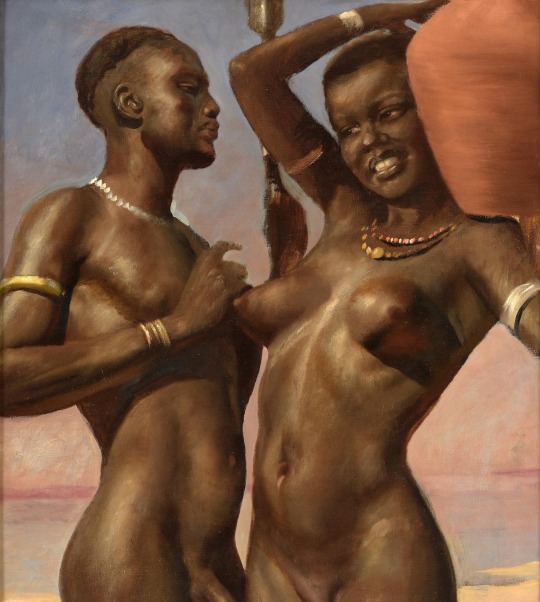
Encounter at the river
German painter best known for his expressive, idealized and provocative depictions of nude women, in the context of the 1920s.
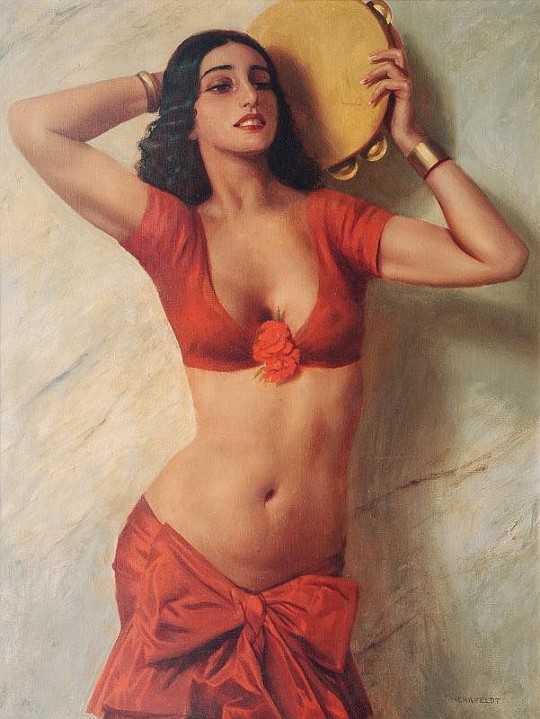
These figures can be seen as the precursors of modern Pinup culture.
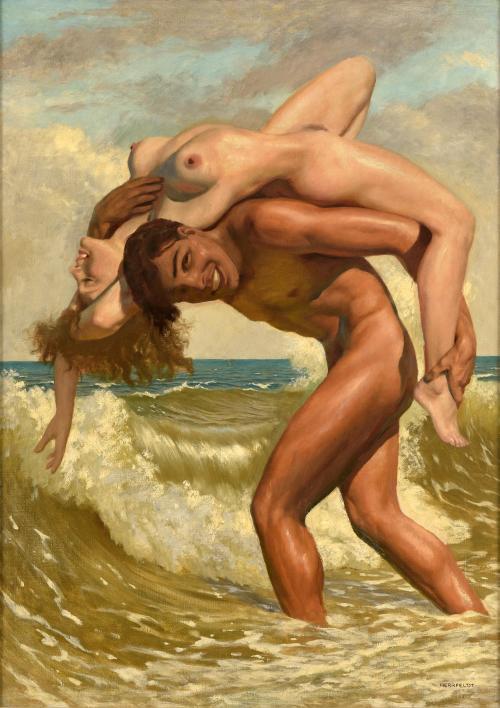
Paris kidnaps his Helena.
His affinity with ancient mythology is crucial and explicit in his masterpiece Poseidon, completed in 1960,
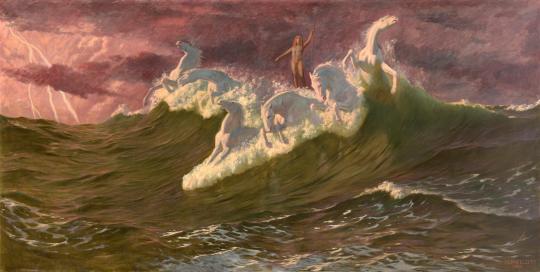
Herrfeldt depicts not only women, but also men. His interpretation of Narciss is a typical example

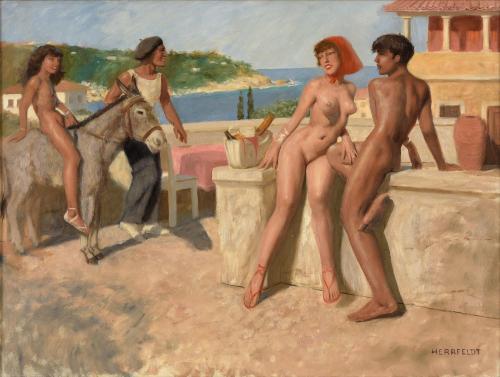
Before the festival.

Greek goatherd.

Munich In the morning sun.
5 notes
·
View notes
Text
youtube
Cluster B Society
A strange new pattern of psychological dysfunction has infiltrated our most prestigious institutions, our corporate bureaucracies and the highest offices in the land. In short, we're sick. Our society is out of balance. We've been consumed by a cluster of disorder that appeals to our worst instincts and deranges our most important social functions. We need to recover our sanity, but to do so we must first know exactly what we're dealing with.
-
Today we are witnessing the emergence of something new. What might be called a Cluster B society. Like the culture of narcissism, our own digital age has a distinct psychological profile: heavily influenced by the power of social media; the cameras are always on; an audience is always watching; and narcissism has transformed into hysteria, moral theatrics, emotional volatility, self-indulgence and outbursts of violence.
Psychologists have captured the spirit of our modern culture in four specific psychopathologies that together comprise the Cluster B personality disorders.
Narcissistic Personality Disorder is characterized by a sense of entitlement, of obsession with one's own self-importance and deep feelings of resentment, often expressed through moral self-righteousness.
Borderline Personality Disorder is characterized by an unstable sense of identity, black and white thinking, feelings of emptiness, and recurring self-harm and suicide attempts.
Histrionic Personality Disorder is characterized by excessive emotionality, sexual provocation and attention seeking, often to serve a pathological need for sympathy.
And Anti-Social Personality Disorder is characterized by impulsivity, manipulation, disregard for others and a penchant for violence and aggression that violates social norms.
But this cluster of social pathologies is no longer an individual matter. It has begun to shape the patterns and structures of our entire culture, which is quickly becoming a Cluster B society that replaces disagreement with accusation, uses false compassion to manipulate citizens into compliance, honors victimhood instead of accomplishment, and enforces the whole scheme with the threat of violence.
For most of our history, significant personality disorders were treated as problems and largely relegated to the fringes of society.
But in our emerging Cluster B Society, the narcissist, the borderline, the hysteric and the anti-social psychological types have been elevated into positions of power and celebrated by our institutions. The new status quo is an emerging leadership class that rules through emotional blackmail. Powerful institutions use the cover of various victim groups to impose their agenda on the rest of us. If we dissent, we're branded as hateful bigots, we're accused of lacking empathy, we are ritualistically banished.
While these strategies are contemptible, they're also remarkably effective in controlling what we think, what we say and how we act, and they've slowly transformed our institutions into what psychologist Andre Lobachevski calls "pathocracy," or "rule by psychological dysfunction." This has become our new social order.
If you look around you'll start seeing it everywhere.
==
A coercive-control society.
#Cluster B#cluster b personality disorder#mental illness#histrionic personality disorder#narcissistic personality disorder#antisocial personality disorder#borderline personality disorder#The Cluster B Society#mental health issues#mental health problems#mental health crisis#pathocracy#victimhood culture#victimhood#emotional manipulation#coercive control#Christopher Rufo#narcissism#hysteria#religion is a mental illness
10 notes
·
View notes
Note
I always thought White Lightning was creepy. Her whole vibe is so off to me
You're right.
Definitely making teenage boys do her bidding and using any sort of 'mind control' is inherently creepy no matter what.
There's nuance to everything however so I'm just going to talk about why I like White Lightning as an idea and why I feel she would be a great villain to bring into modern times.
She did manipulate minors into working for her, whether by her own powers or just by being a social media influencer. Just the THRILL of being with her and part of one her heists was enough to risk criminal records which can have costly, damaging and long-lasting consequences.
In the comics, she seems to rely more on the later than the former when it comes to her heists, but she is not below trying to 'charm' people, even minors into doing what she wants them to. Like when she tried to charm Bart into letting her go, which failed.
It's her social media aspect that has me more interested in her as an idea.
Social media influencers are people that we really do need to have serious conversations about more frequently, because there are a lot of negatives that have come out of the types of content some of these people have created, and more importantly the culture around them. Narcissism, bullying, inability to make independent decisions, anxiety, a catastrophic influx of the fear of making even the slightest perceived imperfection "cringe culture" etc are things that have been at least in part due to influencers. There are other factors at work of course, but influencer culture do have partial blame.
Because comics are always commentary on our world, I feel that White Lightning would be a good villain to use to show this commentary and you would not have to change much of anything about her - because even in 1995 she was using the internet to communicate and reach out to fans and convince them to do things they really, really, should not do.
She's also supposed to be a villain and villains... do these things... y'know. They're not supposed to be upstanding people all the time... Even if they are 'fun'.
Bart said it "She's a crook."
9 notes
·
View notes
Text
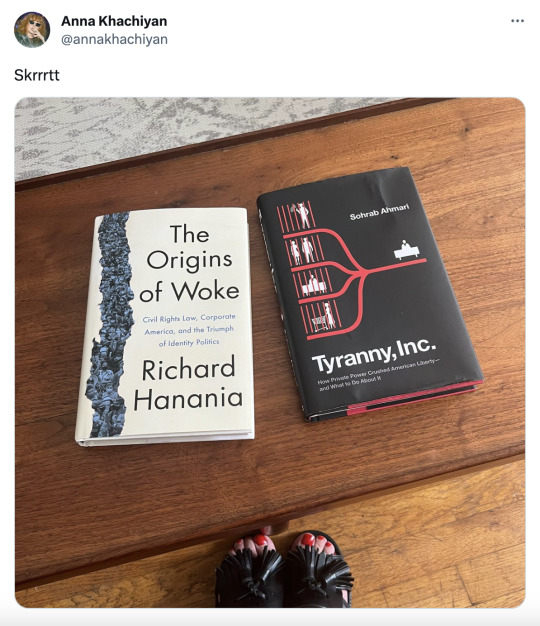
I guess they're about to learn this the hard way on Wikifeet, but the only thing worse than reading philosophy is reading contemporary popular political nonfiction. The past's popular political nonfiction, if it's ripened into a classic, is fine to read—often better than philosophy, in fact, hence my elevation of Emerson and Chesterton over the philosophers. But trying to sift through present-day material for the gems is too much of an opportunity cost. I had the patience for it when I was a kid but not now. I read so many of the Bush-era political books, for example, and what do I have to show for it? When's the last time you heard anybody deploy an insight gleaned from the once painfully au courant Verso volume, Afflicted Powers? Ironically, given how things turned out for all involved, the best of the W. books were probably Mark Crispin Miller's Frankfurt-School-inflected Bush Dyslexicon and Cruel and Unusual.
Anyway, I haven't done an ad on Tumblr in a while, and in another Xeet Anna K advocates "grandiose narcissism," so please let me renew my recommendation to Tumblr's apparently substantial Red Scare contingent of Portraits and Ashes, a novel I wrote in 2013, which foretold the whole Red Scare sensibility. In my later material, though, I have moved on thematically. (A paid subscription to my Substack gets you access to a post containing pdfs of my three prior novels, including Portraits and Ashes, as well as to my serialized novel-in-progress, the occult-themed American epic, Major Arcana.) I wrote my last Red-Scare-ish story, "Sweet Angry God," in 2015, three years before the pod debuted. You can read that story for free here. The opening paragraphs:
Apparently it began with a hate fuck. There was a dirtball café, no doubt collectively owned, a few blocks from the art school. He worked there, and she had been watching him for some months, maybe even her entire sophomore year. The first time she went into the place she noticed him, how hateful and stupid he was. Some kind of percussion-heavy music rumbled over the speakers, hissing with analogue static. She thought she felt the tuba thrum in her throat. Above the music she heard him talk to his co-worker as his face glistened in the espresso machine steam. He didn’t look at her, not even when his dirty fingernails grazed her palm with the change.
“No, Romanian. It was a group, yeah, I mean they allied with Hitler. Not saying I’m defending them, but, I mean. They were pissed off that their culture was being violated by the modern west. Yeah, they hacked people’s heads off. Limbs. Like werewolves, man. Okay, it’s fucked up. But today you just push a button. Is that better? This is their marching music.”
She kept her eye on him after that. Maybe he was dangerous. She would look over her laptop screen when he came out from behind the counter to wipe down the tables. He stomped around in careless bursts, like a toddler. He had a pervert’s goatee and wore bowling shirts stained at the armpits. When she saw his sneakers, so old they’d become fashionable again, she understood what “down-at-heel” literally meant. His body looked sinewy, a bad cut of meat. Stupid-ass white boy. Sometimes she checked certain books out of the library to read in front of him, anything by or about men ready for violence. Marinetti, Mao, Fanon, whatever. His eyes were always elsewhere. Men ready for violence unmade and remade the world. She just lived in it. She wondered if he didn’t want to just live in it.
Her sophomore-year final project she called Men Ready for Violence. Blood-spatter paintings were arrayed around a screen showing various armies on the march. Their choreography contrasted with the chaos of the red paint. She loaded the artist’s statement with jargon, quotations from Klaus Theweleit and Judith Butler, so that her teachers didn’t call a shrink or a cop. Everyone was polite about it, one professor even enthusiastic. Her classmates looked at her strangely. Especially the girls.
Then the semester was over. One week left before she had to come home to mamá. She sat in the café reading Ernst Jünger. He wiped down her table while she was still sitting at it, his face vacantly smiling, the dirt-nailed knob-boned fingers sinking in the washcloth’s soft folds. One week. What would a Romanian fascist do? She reached out and grabbed his wrist hard. Her face must have looked like it couldn’t believe what her hand had done. Her nails were red-stained with oil paint. He was looking at her nails and then turned to look into her eyes. He showed smoker’s teeth.
How did I know in 2015 that this type of young woman, then still immersed in pop Jezebel-style feminism, would soon be getting into aesthetic fascism? Because I'm not a philosopher. I can't afford to let logical argument block the truth.
#anna khachiyan#red scare#creative writing#mark crispin miller#sohrab ahmari#richard hanania#nonfiction#literature
7 notes
·
View notes
Text
Honestly I kind of pity narcissists but I’m also creeped out and annoyed by them. The dissed itself is scary bc it’s probably develops so easily in people now simply bc of all the modern environmental factors like if childhood trauma can crates narcissism is it that much of a stress to say culture contributes to narcissism as well and our culture is just so primes for it. It’s such a weird discussion to have bc to a lot of people it feels very political and convoluted to hear. But I pity them bc the struggle of always believing the worlds against you and letting this perspective rule your life and you burn all bridges and end up angry all the time but incredibly lonely and disliked at the end of the day…
14 notes
·
View notes
Text
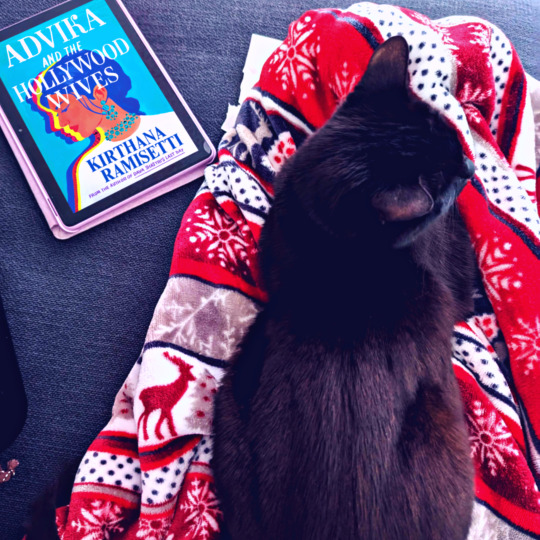
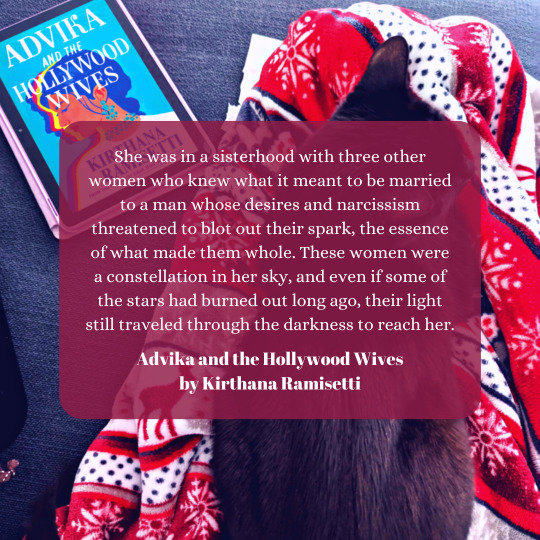
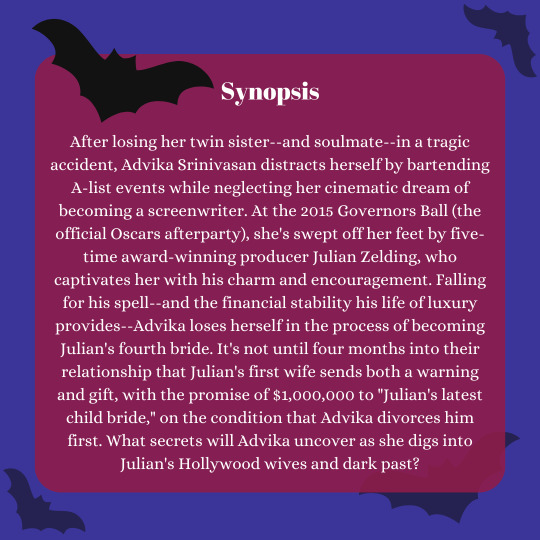
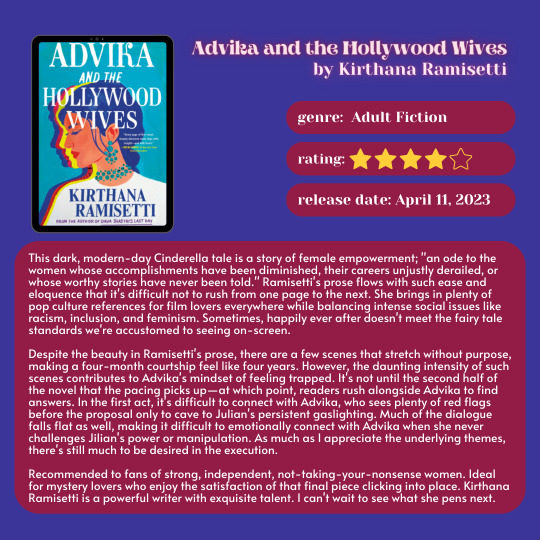

🦇 Advika and the Hollywood Wives Book Review 🦇
Rating: ⭐⭐⭐⭐
❝ She was in a sisterhood with three other women who knew what it meant to be married to a man whose desires and narcissism threatened to blot out their spark, the essence of what made them whole. These women were a constellation in her sky, and even if some of the stars had burned out long ago, their light still traveled through the darkness to reach her. ❞
❓ #QOTD What lessons have you learned from the women before you? ❓
🦇 After losing her twin sister--and soulmate--in a tragic accident, Advika Srinivasan distracts herself by bartending A-list events while neglecting her cinematic dream of becoming a screenwriter. At the 2015 Governors Ball (the official Oscars afterparty), she's swept off her feet by five-time award-winning producer Julian Zelding, who captivates her with his charm and encouragement. Falling for his spell--and the financial stability his life of luxury provides--Advika loses herself in the process of becoming Julian's fourth bride. It's not until four months into their relationship that Julian's first wife sends both a warning and gift, with the promise of $1,000,000 to "Julian's latest child bride," on the condition that Advika divorces him first. What secrets will Advika uncover as she digs into Julian's Hollywood wives and dark past?
💜 This dark, modern-day Cinderella tale is a story of female empowerment; "an ode to the women whose accomplishments have been diminished, their careers unjustly derailed, or whose worthy stories have never been told." Ramisetti's prose flows with such ease and eloquence that it's difficult not to rush from one page to the next. She brings in plenty of pop culture references for film lovers everywhere while balancing intense social issues like racism, inclusion, and feminism. Sometimes, happily ever after doesn't meet the fairy tale standards we're accustomed to seeing on-screen.
🦇 Despite the beauty in Ramisetti's prose, there are a few scenes that stretch without purpose, making a four-month courtship feel like four years. However, the daunting intensity of such scenes contributes to Advika's mindset of feeling trapped. It's not until the second half of the novel that the pacing picks up--at which point, readers rush alongside Advika to find answers. In the first act, it's difficult to connect with Advika, who sees plenty of red flags before the proposal only to cave to Julian's persistent gaslighting. Much of the dialogue falls flat as well, making it difficult to emotionally connect with Advika when she never challenges Jilian's power or manipulation. As much as I appreciate the underlying themes, there's still much to be desired in the execution.
🦇 Recommended to fans of strong, independent, not-taking-your-nonsense women. Ideal for mystery lovers who enjoy the satisfaction of that final piece clicking into place. Kirthana Ramisetti is a powerful writer with exquisite talent. I can't wait to see what she pens next.
🇮🇳 Diversity Representation
✍️ Contemporary Fiction
♀️ Strong Women
🎬 Found Family
🎟️ Age Gap Romance
🦇 Major thanks to the author and publisher for providing an ARC of this book via Netgalley. 🥰 This does not affect my opinion regarding the book.
#book review#book lover#books#reading#book blog#book: advika and the hollywood wives#author: kirthana ramisetti#battyaboutbooks#batty about books
4 notes
·
View notes
Text
THE 2022 AARONS - Best Film
75 films released in 2022 are eligible for this year’s ceremony. That ties a low with the pandemic year of 2020, but my goal was to focus on quality over quantity. Well, at least that’s what I told myself until I opted to watch Disenchanted over Decision to Leave. I did watch a lot of good films last year though. Here are the Aarons for Best Film:

#10. Scream
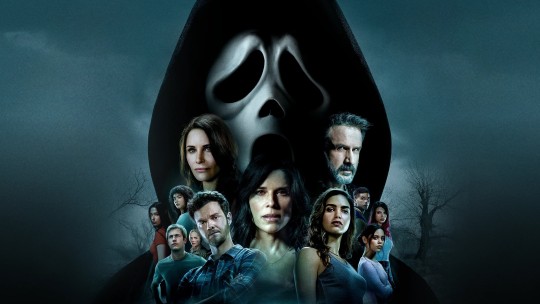
Ready or Not directors Matt Bettinelli-Olpin & Tyler Gillett were the first people brave enough to take a stab at Scream since the passing of director Wes Craven. They slayed at becoming its stewards. The fifth film’s satire has bigger prey in mind than just the slasher subgenre, cutting through a whole culture obsessed with reliving an idealized past. It’s a scary, and pertinent, reminder of how easily infantilized fan-bases can be weaponized against human beings, told with a sly style that would have made Craven proud. While the film features plenty of familiar faces and Ghostfaces, it’s the new blood of current and soon-to-be horror icons like Dylan Minnette and Jenny Ortega that really made the horror-comedy a scream.

#9. The Black Phone

Based on the short story by Joe Hill, The Black Phone recalls the best works of his father Stephen King. The 70s-set serial killer thriller grabs ahold of viewers with its supernatural hook - a phone that converses with the dead - but it’s the clever characters that will keep them captivated. Sinister director Scott Derickson slowly dials up the dread as young Finny Blake tries to escape the clutches of his kidnapper, with the looming specter of past victims making the cost of failure clear. The frightening film’s secret weapon is its resourcefulness, deftly deploying Ethan Hawke’s maniacal villain and eerie 8mm imagery as it lays the groundwork for an off-the-hook finale.

#8. The Batman

Since its debut, every comic book filmmaker has been riddled by the same dilemma: how to eclipse The Dark Knight. If director Matt Reeves, who sharpened his skill for thoughtful blockbusters on Planet of the Apes, didn’t solve the question, he at least gave a very good guess. Reeve’s reinvention pushed the envelope of superhero cinema by drawing inspiration from David Fincher, distinguishing itself in the competitive genre through grounded stakes and great spectacle. Abetted by Paul Dano’s riveting Riddler and Robert Pattison’s arresting, arrestedly-developed version of the vigilante, the twists and turns of the mystery noir keep viewers tightly-wound even after its dam breaks open.

#7. TÁR

TÁR’s composition is unusual: it begins with a full set of production credits, shown in reverse of traditional order. The switch-up is the opening salvo of a film fully intent on upsetting power dynamics. The three-hour character piece plays with audiences’ sympathies as it chronicles the collapse of famous (fictional) symphony composer Lydia Tár. The nuanced tale of narcissism takes some cues from modern day ‘cancel culture,” but the tenor is a tragedy as classical as they come. To alleviate trepidation, it’s important to note that TÁR isn’t as stuffy as it may sound: the coda of this unusual composition is a rollicking punchline as appropriate as it is unpredictable.

#6. Pearl

Pearl is a gem. Filmed in secret alongside its predecessor (more on that shortly) and released a few months later, the prequel extrapolates X into a compelling study of its eponymous character. The wickedness of the Oz-inspired technicolor terror contrasts itself through its singular focus. Tracing the lead-up to Pearl’s first string of murders in 1918 as her fairy tale dreams turn into a deranged fervor, the film keeps the body count going but the spotlight fixed on the incontestable star power of Mia Goth. Goth’s devotion to the demented ending guarantees that, while X is extricating, Pearl will always linger in the back of one’s mind.

#5. X

‘Elevated horror,’ the designation given to the recent trend of arthouse films, has routinely struggled to find the right balance between lofty thematic ambitions and expected genre titillation. X marks the spot. The trick was in fixating both on being unabashed about one’s nature. The thrust of Ti West’s throwback grindhouse flick, which documents a group of sexually-liberated filmmakers’ fateful encounter with an envious elderly couple, is a morality play about accepting mortality. The sexed-up slasher doesn’t skimp on penetrating flesh though, with gnarly gore effects designed by Wētā Workshop. It could have been objectifying and objectionable material, but West directs it all with a curious compassion; as a result, X multiplied wins for his films this year.

#4. The Banshees of Inisherin

Banshees is a lament of ghosting gone wrong. Martin McDonagh’s drama escalates an unconscientious uncoupling - truthful but tactless - between two life-long best friends to its most absurd and absurdly funny degree. Backdropped by the Irish Civil War, the boiling tension between the curiously incongruous but synchronously stubborn pairing of Brendan Gleeson’s ambitious Colm and Colin Farrell’s simplistic Pádraic highlights how quickly spite can erode one’s better angels. It’s a downbeat design yet Inisherin’s spirit lies in its impeccably witty dialogue. They may not be able to put their finger on whether it’s gaiety or grief, but audiences will be howling in response to Banshees for one reason or the other.

#3. Speak No Evil

Much has been said recently about horror’s use as a vehicle to process past trauma; Speak No Evil returns the conversation to the genre’s custom of cautionary tales. Danger lies ahead, not behind, of the film’s family when they accept an invitation to an idyllic weekend stay with a foreign couple. Evil preys on the unprepared; the insidious nature of its terror isn’t clear until its trap is already sprung. For the unassertive, the Danish film is uniquely devastating. The less said to prospective viewers, the better, though rest assured that Speak No Evil deserves every good word.

#2. The Fabelmans

Steven Spielberg has spent a lifetime doing his dream work and capturing his audiences’ imagination along the way. Loosely based on his own childhood, The Fablemans brings that wide-ranging filmography into focus. The assortment of anecdotes is one of the director’s funniest films and undoubtedly his most vulnerable. While this semi-autobiographical story could have been a simple victory lap for the septuagenarian, Spielberg’s sentimentality has always been far wiser than critics claim. The sure to be sacred text to future generations of filmmakers is certainly a testament to the magic of movies. Yet, even as Spielberg reframes his past, the learned moral imparted by The Fabelmans is really about what cinema is unable to control.

AND THE BEST FILM OF 2022 IS...
#1. Everything Everywhere All At Once

Movie multiverses may be inescapable at the moment, but no project encapsulates the concept’s infinite possibilities more than Everything Everywhere All at Once. The revolutionary martial-arts flick runs like The Matrix trading its estrogen for ecstasy as it awakens an under-audit laundromat owner to the larger worlds around her. The film’s directors, collectively credited as Daniels, learned the tools of the trade on the offbeat Swiss Army Man and apply that same sense of humor here: one that’s lewd, ludicrous, and incredibly life affirming. Able to transform a universe of humans with hot dogs for fingers from joke to tearjerker and back again, the film is continually unexpected but everything one’s ever wanted all at once.

NEXT UP: THE 2022 AARONS FOR WORST FILM!
#film#TheAarons#TheAaronsFilm#TheAarons2022#best film#best picture#best of 2022#top 10#everything everywhere all at once#the fabelmans#speak no evil#the banshees of inisherin#x#pearl#tar#the batman#the black phone#scream
8 notes
·
View notes
Text
The Culture of Narcissism - Christopher Lasch
American Life in An Age of Diminishing Expectations.
Preface:
The Awareness Movement and the Social Invasion of the self
- Sense of Ending which has given shape to so much of twentieth century literature : as the twentieth century approaches its end, the conviction grows that many other things are ending too.’ .
‘The contemporary climate is therapeutic not religious. people today hunger not for personal salvation, let alone for the restoration of an earlier golden age, but for the feeling, the momentary illusion of personal well-being, health, and psychic security.’ (pp.7)
‘Having displaced religion as the organizing framework of American culture, the therapeutic outlook threatened to displace politics aswell.; (pp13)
- surrender yourself to the latest products of modern technology
The Narcissistic Personality of Our Time
- ‘every age develops its own peculiar form of pathology which express in exaggerated form its underlying character structure.’ In Freuds time hysteria and obsessional neurosis carried to extremes the personality traits associated with the capitalist order at an earlier stage in its development - fanatical devotion to work.
- ‘The ethic of self preservation and psychic survival is rooted the, not merely in objective conditions of economic warfare, rising rates of crime and social chaos but in the the subjective experience of emptiness and isolation.’ (0051)
- ‘The ideology of personal grown, superficially optimistic, radiates a profound disrepair and resignation. ‘(pp51)
Changing Modes of Making It
- Protestant work ethic was one of the most important underpinnings of American culture. according to the myth of capitalist enterprise thrift and industry held the key to material success and spiritual fulfillment.’
- ‘The self made man, archetypal embodiment of the American dream owed his advancement to habits of industry, sobriety, moderation self discipline and avoidance of debt.’
- In the age of diminishing expectations the protestant virtues no longer excite enthusiasm.’ (pp.53)
- ‘Self preservation has replaced self improvement as the goal of earthly existence.’
The Eclipse of Achievement:
- ‘In a society in which the dream of success has been drained of any meaning beyond itself, men have nothing against which to measure their achievements except the achievements of others.’ (pp.59)
‘Self-approval depends on public recognition and claim, and the quality of this approval has undergone.’ ‘Today men seek approval the kind of approval that applauds not their actions but their personal attributes. they wished not so much to be esteemed, but admired.’
‘They crave not fame, but the glamour and excitement of celebrity. they want to be envied rather than respected. pride and acquisitiveness, the sins of an ascendant capitalist have given way to vanity.’
‘Success in our society needs to be ratified by publicity.’ (pp.60)
‘The propaganda of death and destruction emanating ceaselessly from the mass media, adds to the prevailing atmosphere of insecurity.’
- Absence of continuality in the converge of events ....
Ironic Detachment as an escape from routine
- I’m our society, anxious self criticism only serves to regulate information signaled to others. It also established an ironic distance from the deadly routine of daily life.’ (pp94)
- ‘He takes refuge in jokes, mockery and cynicism. - by refusing to take seriously the routines he has to perform, he denies their capacity to injure him.’ (pp.95)
- ‘by demystifying daily life, he conveys to himself and others the impression that he has risen above it, even as he goes through the motions and does what is expected of him.’ (pp.95)
The socialization of reproduction and the collapse of authority
- ‘as the child begins to perceive his mothers limitations he relinquishes the image of maternal perfection and begins to take over many of her functions to provide for his own comfort. Any idealized version of the mother lives on the child’s subconscious. Diminished however by the daily experience of maternal fallibility’
- the Marcus stick mother incessant yet curiously perfunctory attentions go her c go of interfere with the mechanism of optimal frustration.’ Because she so often sees the child as an extension of herself she lavishes awkward out of touch attentions onto the child
- by treating her child as an exclusive Possession she encourages an exaggerated sense of his own importance.’ Pp173
- ‘co fixed her child deserves the best of everything she arranges every detail of his life with a zeal that undermines his initiative and destroys his capacity for self-help’ (pp.173)
-Women with "otherwise well-integrated personalities, according to Dr. Reich, unconsciously seek to please a narcissistic mother by replacing the missing father, either by elaborating grandiose fantasies of success or by attaching themselves to successful men.’ (pp.174)
The flight from feeling: sociopathology of the sex war
Russel once predicted that the socialization of reproduction - the super session of the family by the state- would make def move itself. Orr trivial ‘en courage a certain trivia Ty in all personal relate so
‘the cult of intimacy conceals a growing despair of finding it.’ (pp.188)
6 notes
·
View notes